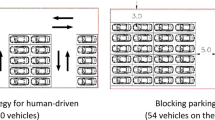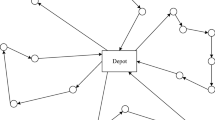Abstract
In this paper, we propose a benchmark problem for the challengers aiming to energy efficiency control of hybrid electric vehicles (HEVs) on a road with slope. Moreover, it is assumed that the targeted HEVs are in the connected environment with the obtainment of real-time information of vehicle-to-everything (V2X), including geographic information, vehicle-to-infrastructure (V2I) information and vehicle-to-vehicle (V2V) information. The provided simulator consists of an industrial-level HEV model and a traffic scenario database obtained through a commercial traffic simulator, where the running route is generated based on real-world data with slope and intersection position. The benchmark problem to be solved is the HEVs powertrain control using traffic information to fulfill fuel economy improvement while satisfying the constraints of driving safety and travel time. To show the HEV powertrain characteristics, a case study is given with the speed planning and energy management strategy.






















Similar content being viewed by others
References
Zhou, Q., Zhao, D., Shuai, B., Li, Y., Williams, H., & Xu, H. (2021). Knowledge implementation and transfer with an adaptive learning network for real-time power management of the plug-in hybrid vehicle. IEEE Transactions on Neural Networks and Learning Systems, 32(12), 5298–5308. https://doi.org/10.1109/TNNLS.2021.3093429
Xu, F., & Shen, T. (2021). Decentralized optimal merging control with optimization of energy consumption for connected hybrid electric vehicles. IEEE Transactions on Intelligent Transportation Systems. https://doi.org/10.1109/TITS.2021.3054903
Zhuang, W., Li, S., Zhang, X., et al. (2020). A survey of powertrain configuration studies on hybrid electric vehicles. Applied Energy, 262, 114553.
Wang, S., Chen, K., Zhao, F., & Hao, H. (2019). Technology pathways for complying with corporate average fuel consumption regulations up to 2030: A case study of China. Applied Energy, 241, 257–277.
Zhang, J., Shen, T., & Kako, J. (2020). Short-term optimal energy management of power-split hybrid electric vehicles under velocity tracking control. IEEE Transactions on Vehicular Technology, 69(1), 182–193.
Asaei, B. (2010). A fuzzy-genetic algorithm approach for finding a new HEV control strategy idea. 1st Power Electronic and Drive Systems and Technologies Conference, pp. 224 – 229. Tehran, Iran.
Wu, J., Zhang, C. H., & Cui, N. X. (2008). PSO algorithm-based parameter optimization for HEV powertrain and its control strategy. International Journal of Automotive Technology, 9(1), 53–59.
Lin, C. C., Peng, H., Grizzle, J. W., & Kang, J.-M. (2003). Power management strategy for a parallel hybrid electric truck. IEEE Transactions on Control Systems Technology, 11(6), 839–849.
Luján, J. M., Guardiola, C., Pla, B., & Reig, A. (2018). Analytical optimal solution to the energy management problem in series hybrid electric vehicles. IEEE Transactions on Vehicular Technology, 67(8): 6803 – 6813.
Larsson, V., Johannesson, L., & Egardt, B. (2014). Analytic solutions to the dynamic programming subproblem in hybrid vehicle energy management. IEEE Transactions on Vehicular Technology, 64(4), 1458–1467.
Serrao, L., Onori, S., & Rizzoni, G. (2009). ECMS as a realization of Pontryagin’s minimum principle for HEV control. American Control Conference, pp. 3964-3969. St. Louis, MO, USA.
Kim, N., Cha, S., & Peng, H. (2011). Optimal equivalent fuel consumption for hybrid electric vehicles. IEEE Transactions on Control Systems Technology, 20(3), 817–825.
Rezaei, A., Burl, J. B., Solouk, A., Zhou, B., et al. (2017). Catch energy saving opportunity (CESO), an instantaneous optimal energy management strategy for series hybrid electric vehicles. Applied Energy, 208, 655–665.
Xie, S., Hu, X., Qi, S., & Lang, K. (2018). An artificial neural network-enhanced energy management strategy for plug-in hybrid electric vehicles. Energy, 163, 837–848.
Zhang, J., & Shen, T. (2016). Real-time fuel economy optimization with nonlinear MPC for PHEVs. IEEE Transactions on Control Systems Technology, 24(6), 2167–2175.
Sciarretta, A., Serrao, L., Dewangan, P. C., et al. (2014). A control benchmark on the energy management of a plug-in hybrid electric vehicle. Control Engineering Practice, 29, 287–298.
Lars, E. (2019). An overview of various control benchmarks with a focus on automotive control. Control Theory and Technology, 17(2), 121–130.
Moura, S. J., Fathy, H. K., Callaway, D. S., & Stein, J. L. (2010). A stochastic optimal control approach for power management in plug-in hybrid electric vehicles. IEEE Transactions on Control Systems Technology, 19(3), 545–555.
Sun, C., Hu, X., Moura, S. J., & Sun, F. (2014). Velocity predictors for predictive energy management in hybrid electric vehicles. IEEE Transactions on Control Systems Technology, 23(3), 1197–1204.
Xiang, C., Ding, F., Wang, W., & He, W. (2017). Energy management of a dual-mode power-split hybrid electric vehicle based on velocity prediction and nonlinear model predictive control. Applied Energy, 189, 640–653.
Sun, C., Sun, F., & He, H. (2017). Investigating adaptive-ECMS with velocity forecast ability for hybrid electric vehicles. Applied Energy, 185, 1644–1653.
Zhang, F., Hu, X., Langari, R., & Cao, D. (2019). Energy management strategies of connected HEVs and PHEVs: Recent progress and outlook. Progress in Energy and Combustion Science, 73, 235–256.
Yang, C., Zha, M., Wang, W., Liu, K., & Xiang, C. (2020). Efficient energy management strategy for hybrid electric vehicles/plug-in hybrid electric vehicles: Review and recent advances under intelligent transportation system. IET Intelligent Transport Systems, 14(7), 702–711. https://doi.org/10.1049/iet-its.2019.0606
Zhang, J., Xu, F., Zhang, Y., & Shen, T. (2019). ELM-based driver torque demand prediction and real-time optimal energy management strategy for HEVs. Neural Computing and Applications, 32: 14411C14429.
Zhang, B., Zhang, J., Xu, F., & Shen, T. (2020). Optimal control of power-split hybrid electric powertrains with minimization of energy consumption. Applied Energy, 266, 114873.
Zhang, F., Xi, J., & Langari, R. (2016). Real-time energy management strategy based on velocity forecasts using V2V and V2I communications. IEEE Transactions on Intelligent Transportation Systems, 18(2), 416–430.
Li, J., Zhou, Q., He, Y., et al. (2019). Dual-loop online intelligent programming for driver-oriented predict energy management of plug-in hybrid electric vehicles. Applied Energy, 253, 113617.
Qi, X., Wu, G., Hao, P., Boriboonsomsin, K., & Barth, M. J. (2017). Integrated-connected eco-driving system for PHEVs with co-optimization of vehicle dynamics and powertrain operations. IEEE Transactions on Vehicular Technology, 2(1), 2–13.
Uebel, S., Murgovski, N., B\(\ddot{\rm a}\)ker, B., & Sj\(\ddot{\rm o}\)berg, J. (2019). A two-level mpc for energy management including velocity control of hybrid electric vehicles. IEEE Transactions on Vehicular Technology, 68(6): 5494–5505.
Chen, B., Evangelou, S. A., & Lot, R. (2019). Hybrid electric vehicle two-step fuel efficiency optimization with decoupled energy management and speed control. IEEE Transactions on Vehicular Technology, 68(12), 11492–11504.
Wang, S., & Lin, X. (2020). Eco-driving control of connected and automated hybrid vehicles in mixed driving scenarios. Applied Energy, 271, 115233.
Zhang, J., & Xu, F. (2020). Real-time optimization of energy consumption under adaptive cruise control for connected HEVs. Control Theory and Technology, 18(2), 182–192.
Fu, Q., Xu, F., Shen, T., & Takai, K. (2020). Distributed optimal energy consumption control of HEVs under MFG-based speed consensus. Control Theory and Technology, 18(2), 193–203.
Chen, B., Evangelou, S. A., & Lot, R. (2019). Series hybrid electric vehicle simultaneous energy management and driving speed optimization. IEEE/ASME Transactions on Mechatronics, 24(6), 2756–2767.
Hu, Q., Amini, M. R., Feng, Y., Yang, Z., Wang, H., Kolmanovsky, I., & Seeds, J. B. (2020). Engine and aftertreatment co-optimization of connected HEVs via multi-range vehicle speed planning and prediction. SAE Technical Paper, -01-0590.
Xu, F., & Shen, T. (2020). Look-ahead prediction-based real-time optimal energy management for connected HEVs. IEEE Transactions on Vehicular Technology, 69(3), 2537–2551.
Xu, F., & Shen, T. (2019). MPC-based optimal control for diesel engine coupled with lean NOx trap system. SICE Journal of Control, Measurement, and System Integration, 12(3), 94–101.
Author information
Authors and Affiliations
Corresponding author
Rights and permissions
About this article
Cite this article
Xu, F., Tsunogawa, H., Kako, J. et al. Real-time energy optimization of HEVs under-connected environment: a benchmark problem and receding horizon-based solution. Control Theory Technol. 20, 145–160 (2022). https://doi.org/10.1007/s11768-022-00086-y
Received:
Revised:
Accepted:
Published:
Issue Date:
DOI: https://doi.org/10.1007/s11768-022-00086-y




